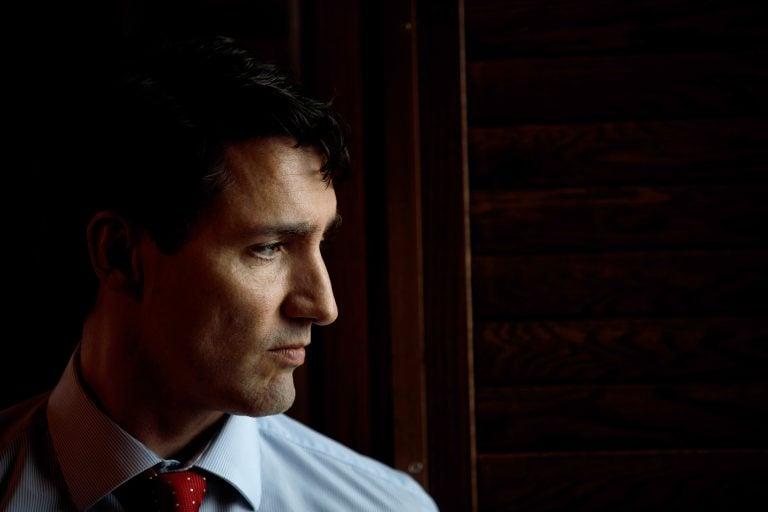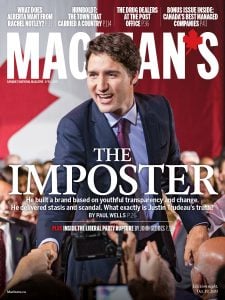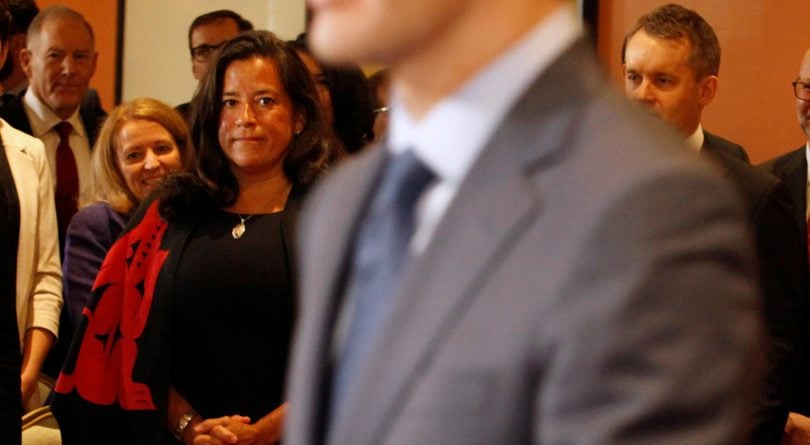Justin Trudeau, imposter
Paul Wells: The phoniness of the Prime Minister’s handling of the SNC-Lavalin file is a trait he shows the Canadian people all too often

Prime Minister Trudeau in his Centre Block office in Ottawa on Dec. 8, 2016. (Adam Scotti/PMO)
Share
The story a few Liberals were telling privately, in the early hours after Jody Wilson-Raybould delivered her extraordinary testimony to the Commons justice committee about the endless procession of men who tried to make her cancel a criminal trial for SNC-Lavalin, was that she just didn’t get it.
The former attorney general is a nice enough sort, the story went, but she doesn’t really understand the way the world works. The whole point of amending the Criminal Code to provide for deferred prosecution agreements (DPAs) was to make that option—a sort of negotiated fine in lieu of a trial for fraud and bribery—available to SNC-Lavalin. And if the option was available, why not use it? Jobs were at stake. Elections were at stake. Elections, plural, for Pete’s sake. First an election in Quebec last autumn, then a federal election this autumn.
So you could drag SNC through the mud of a court trial, long after the individual executives who actually did any frauding and bribing had fled the company, for what? To visit punishments upon everyone else in the company? To maybe scare it out of Montreal for good? To endanger the jobs of thousands of fine upstanding Quebecers and other Canadians? On the eve of elections? Plural?
READ MORE: Trudeau and senior Liberals kept linking SNC-Lavalin prosecution to elections
All of this was just so obvious to everyone who leaned on Wilson-Raybould, it was said privately. What the heck was she missing? Why didn’t she get it?
If it’s any comfort to the former attorney general, at least she can rest assured that she’s not the only person who didn’t get that blindingly obvious fix-the-Criminal-Code-to-suit-SNC-Lavalin-and-save-jobs-and-Liberal-hides connection. Because also out of the loop were the people of Canada. And if we were out of the loop, it’s because Justin Trudeau and his apparently inexhaustible supply of yes-men worked hard to keep us uninformed.
No part of the plan to save SNC-Lavalin was presented to the people of Canada, while it was being deployed, as a plan to save SNC-Lavalin. Who had called for the thing? Small businesses and NGOs, a Justice Department official said when the House Finance Committee inquired last autumn. The Quebec engineering giant was never mentioned in her testimony.
When the government inserted the DPAs into the Criminal Code, how did it announce the move? With a single paragraph on page 202 of the 2018 federal budget document, under the catchy heading “Addressing corporate integrity.” You really had to go to page 202 to learn anything at all about the scheme. Finance Minister Bill Morneau made no mention of it in his nationally televised budget speech.
And how was the DPA described on page 202, for insatiably curious or insomniac readers who might stumble across it? As a way to get tough on corporate wrongdoers. DPAs would be “an additional tool to hold corporate offenders to account,” the document said. They would “sanction criminal conduct appropriately and deter wrongdoing.”
Now, a federal budget document is a bulky thing, drafted and reviewed by dozens of government employees. They found no room in its 367 pages to mention that SNC had been pleading for this tough accountability crackdown for months. At massive expense. As a handy rule of thumb, corporate offenders don’t usually plead for additional tools to hold them to account.
RELATED: SNC-Lavalin’s allies in its push to avoid prosecution
Long story short, the government of Canada was telling one story to itself and another to Canadians. To themselves, they said they were protecting jobs. To the rest of us, they said they were getting tough. A government that indulges in that much sustained double-talk clearly thinks it has something to hide. It’s being disingenuous. It’s being phony. And since the lot of them never stop calling themselves #TeamTrudeau on Twitter, I guess we can, without fear of contradiction, say the Prime Minister of Canada has been the phony-in-chief.
If Trudeau is now saying his only priority was to save jobs, it’s because he got caught. If he refuses to say out loud what a majestic procession of Liberal minions kept telling Wilson-Raybould behind closed doors—that he was especially interested in saving Liberal jobs in back-to-back election years—it’s because that’s the kind of guy he is. He low-bridged a major change to criminal prosecutions while a large company was facing charges, depicting as a crackdown what was actually an escape hatch, because he didn’t dare simply say what he wanted. Didn’t think it would pass the smell test of the Canadian people. Didn’t think what he was doing was defensible.
And he was right.
READ MORE: Jody Wilson-Raybould’s opening statement at justice committee: Full transcript
And I don’t even need Wilson-Raybould to be any kind of hero to note that her response to this whole clandestine business was close to what my reaction or yours would have been if Trudeau and his legions had condescended to let us in on what they were doing: You’re going to do what now? You’re amending the Criminal Code to cancel a trial for a company that racked up a king’s ransom in lobbying bills to plead for this change? After the trial was already scheduled? No thanks.
She wanted to back the country’s public prosecutor, to let a court do what courts do every day: weigh and judge. He wanted to change the rules mid-game and hope we wouldn’t notice.
And the problem for Trudeau—who came to power promising a new era of transparency—is that this phoniness is a trait he shows all too often.
 In 2016, when the Globe and Mail reported that the Prime Minister had attended a Vancouver fundraiser attended by Chinese billionaires—one of whom promptly donated money to the private Montreal foundation named for Trudeau’s father—the Liberal Party of Canada said no government business is discussed at such events. Trudeau later admitted they asked about policy and he talked about jobs.
In 2016, when the Globe and Mail reported that the Prime Minister had attended a Vancouver fundraiser attended by Chinese billionaires—one of whom promptly donated money to the private Montreal foundation named for Trudeau’s father—the Liberal Party of Canada said no government business is discussed at such events. Trudeau later admitted they asked about policy and he talked about jobs.
Legalizing cannabis is one of the signature achievements of this government. But Trudeau has never been able to say he did it so affluent consumers could more readily get high. Instead, he had everyone in his government swear the goal was to drain the black market and keep the stuff out of the hands of teenagers. Neither goal has come anywhere close to being reached. Judged by the standards of a bake-off for the children of privilege, legalization has been a great success. Judged by the standards the Prime Minister claims, it’s a mess. The operating assumption seems to be that we’re simply supposed to read between the lines—that we’ll understand that when Trudeau speaks he is not to be taken seriously.
Why would he? In June 2016, I asked Trudeau whether he had a preference in the electoral-reform debate he had promised in the previous year’s election, and whether his preference would influence the outcome. It was the sort of question you ask even when you know the answer. Everyone knew Trudeau wanted preferential ballots, which would favour large parties like his.
RELATED: Why we broke our electoral reform promise. Signed, a Liberal MP.
He swore that wasn’t so. “I’m really open to listening to Canadians. And actually, I have moved in my thinking toward a greater degree of openness toward what Canadians actually want.” So while Liberals would prefer ranked ballots, “Canadians might not agree. And I think this is an important conversation to have, where we do have to respect Canadians.”
Months later, he told the Toronto Star editorial board that he wasn’t about to throw in the towel. “Canadians elect governments to do hard things, and don’t expect us to throw up our hands when things are a little difficult,” he said. “ ‘Oh, it’s more difficult than we thought it could be and therefore we’re just going to give up.’ No, I’m sorry, that’s not the way I was raised, that’s not the way I’m going to move forward on a broad range of issues, regardless of how difficult they may seem at a given point.”
Eight weeks later, he abandoned electoral reform because the emerging consensus was for the reform option he didn’t like, proportional representation. I don’t even know what you do with a guy who acts like that. Eventually he took to wearing his abandonment of a key platform plank as a badge of honour. He wasn’t going to endanger Canadian democracy by keeping an election promise. Not all heroes wear capes.
And so it goes. When Saudi Arabia’s ruling family was briefly regime non grata after the death and dismemberment of journalist Jamal Khashoggi last autumn, Trudeau mused twice, in October and December, about cancelling a $15-billion arms deal with the Saudis. Now that the Khashoggi murder isn’t making daily headlines anymore, the arms deal remains uncancelled.
I could keep picking examples of Trudeau acting one way and talking another (climate change, Indigenous reconciliation) until the cows come home. But at some point you’d say, with reason, that this is not exactly innovative behaviour for an elected politician. But what’s so damaging about the SNC-Lavalin affair is that, in private, there’s no evidence Trudeau governs as the future-looking sophisticate he plays on TV.

He’s the first modern PM to go without an “industry minister” because he wanted an “innovation minister” instead. He talks all the time about how diversity of background and diversity of perspective strengthen a government. And then it turns out that the most innovative thing he can think to do when it comes to jobs in Quebec is to prop up the local construction firm. For the oldest reason in the world: it’s an election year, or it just was, or it will be some day.
There’s a stack of assumptions behind that strategy as long as your arm: that SNC does work so good it could never be replaced, that a trial would wreck it, that a mere judge couldn’t possibly weigh the company’s social contribution in determining its legal liability. And the biggest assumption of them all is that all of this is so obvious, none of it needed explaining in two years of feverish PMO activity. Not to the attorney general—she got earfuls of explanation, delivered in shifts working overtime, for months after she made what Trudeau felt was the wrong decision. And not to you and me. Trudeau never thought you and I deserved to know why he was trying to keep SNC out of a trial court. This makes a mockery of a simple idea: the consent of the governed.
It turns out that behind the curtain, the wizard from the woke future of politics was indulging the oldest of old-fashioned industrial policy. Navdeep Bains, the so-called innovation minister, might as well legally change his name to C.D. Howe for all the innovation going on here.
As for Wilson-Raybould’s diversity of background and perspective, it turned out to be inconvenient. She didn’t buy into a cozy meeting of minds along the Toronto-to-Montreal corridor. And the meeting of minds was what really mattered. Because it’s 2019.